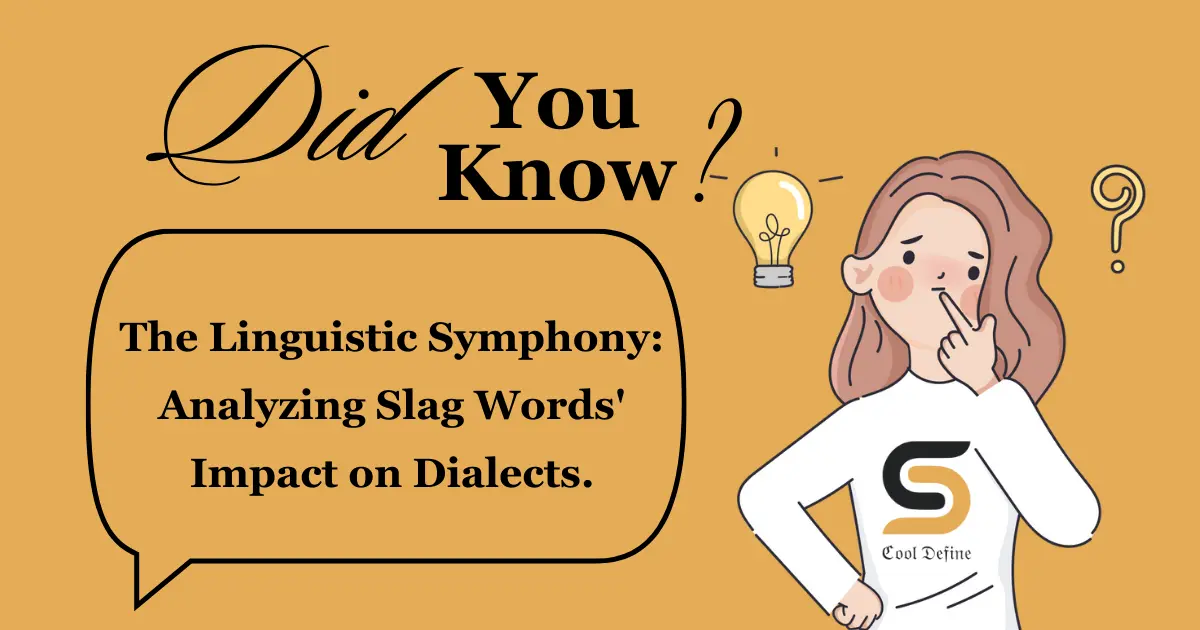The Ultimate Slang Term Encyclopedia that slang language is a fascinating aspect of communication, providing an informal and expressive way to interact with others. Moreover, People commonly use it in everyday conversations to add flair, humor, or emphasis to the exchange of ideas.
Whether among friends or in social media interactions, people use slang words and phrases to describe feelings, situations, or actions in a more relatable and casual manner.
The implication of using slang words varies depending on the context in which people employ them. While slang can create a sense of belonging and camaraderie among peers, it may also be seen as unprofessional or disrespectful in certain environments. Understanding when and where to use slang terms is crucial in navigating social interactions effectively.
People often incorporate slang terms in their speech to appear current, trendy, or connected to specific subcultures or demographics. Slang is a way to express individuality and create a sense of identity within a group. By using slang, individuals can signal their familiarity with popular culture references or demonstrate a shared understanding of contemporary language trends.
History of Slang
Unlocking the Vault of Urban Dictionary: The Ultimate Slang Term Encyclopedia
The slang dictionary is a comprehensive list of words and expressions that are often used in modern slang. From British slang to English slang, the dictionary provides an extensive collection of popular slang terms used to refer to various things.
People still use the common term “bling” today, which is slang for money. Furthermore, People may also use this term as a verb, as in “I’m going to bring it up.” Another popular slang expression is “lit,” which means something.
Unlocking the Vault of Urban Dictionary: The Ultimate Slang Term Encyclopedia
When it comes to understanding modern slang, Urban Dictionary is the go-to resource for a comprehensive list of terms and phrases.
The younger generation uses this slang dictionary as a treasure trove of popular slang.
It not only covers modern slang but also delves into old slang still used today.
Users can use the term they’re seeking to learn its slang meaning and how people often use it. Whether it’s a common term like “lit” or a new slang expression, Urban Dictionary has it all. Moreover, one intriguing aspect of the website includes the inclusion of slang names for bad words alongside more lighthearted terms.
Depending on the context, the word may have different meanings, and the Urban Dictionary provides examples of slang used in sentences to illustrate this. Even British slang and English slang have their sections, showing internet slang usage worldwide. If you’re curious about slang money, slang for money, or any other slang term, Urban Dictionary has you covered.
People in different regions or communities may use different slang terms to refer to the same concept as they use a word. This highlights how language diversity allows for various interpretations of words and expressions. Some slang phrases function as verbs, while others serve as nouns.
Commercial partnerships contributing to the site’s monetization have led to an increase in adding new words to the database, including “on fleek,” describing perfect style.
One interesting aspect of modern slang is the monetization of certain words and phrases.
For instance, the commercial world capitalizes on slag like “yet,” seen on merchandise and ads, and “bae,” primarily a term of endearment. This use of the term demonstrates how new words can take on a new form and meaning in the ever-evolving world of internet slang.
Various social groups and subcultures originated slang language, developing unique terminologies to communicate within their communities. Slang has evolved through cultural exchanges, migration, and globalization, adapting to new contexts and influences. From the jargon of street gangs to the language of musicians and artists, slang continues to reflect the dynamic nature of human expression.
Slang plays a significant role in different cultures by encapsulating the values, beliefs, and attitudes of specific social groups. It serves as a form of linguistic code that distinguishes insiders from outsiders, providing a sense of belonging and exclusivity. In multicultural societies, slang can act as a bridge between diverse communities, facilitating communication and fostering understanding
American Slang and Variants
Slang encompasses a wide range of expressions and idioms that reflect the cultural diversity of the United States.
American slang, with regional nuances in pronunciation, vocabulary, and unique phrases, embodies the richness of American English. In urban centers or rural communities, people use slang terms to express local identities and shared experiences.
Regional American slang varies due to historical, social, and economic factors, shaping language patterns uniquely across states and regions.
Rhyming slang is a creative form of phraseology that involves using words or phrases that rhyme with the intended meaning. By substituting a word with a rhyming phrase, speakers can convey ideas playfully and cryptically. Cockney rhyming slang, a famous example of this technique, originated in London’s East End and has since become popular worldwide.
Conclusion
Exploring the world of slang language reveals a treasure trove of creativity, innovation, and cultural significance. Slang infuses daily interactions in New York City streets and London alleys, enriching communication with vibrant lexicon and dynamic expressions.
Exploring Urban Dictionary unveils slang’s evolution, bridging generations, communities, and subcultures with dynamic words and phrases.



